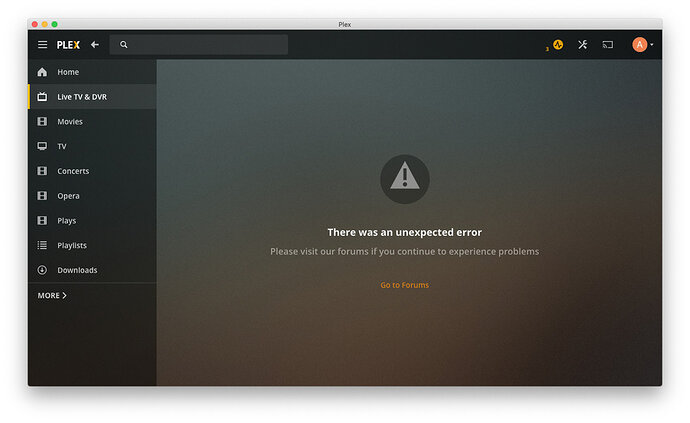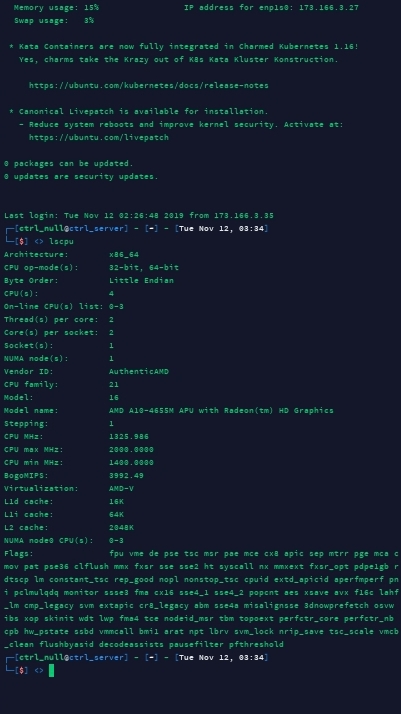Hey thanks for the logs.
There were mostly clean. A couple of small things appeared. It’s finding 2 NICs to listen on, and there’s some struggle going on with LiveTV-DVR.
Nov 09, 2019 15:18:00.602 [0x700004480000] DEBUG - NetworkService: Network change for browser (polled=0), closing 0 browse sockets.
Nov 09, 2019 15:18:00.602 [0x700004480000] DEBUG - NetworkService: Setting up multicast listener on 0.0.0.0:32413
Nov 09, 2019 15:18:00.602 [0x700004480000] DEBUG - NetworkService: Browsing on interface 127.0.0.1 on broadcast address 127.255.255.255 (index: 0)
Nov 09, 2019 15:18:00.602 [0x700004480000] DEBUG - NetworkService: Browsing on interface 10.0.1.28 on broadcast address 10.0.1.255 (index: 1)
Nov 09, 2019 15:18:00.602 [0x700004480000] DEBUG - NetworkService: Browsing on interface 10.0.1.50 on broadcast address 10.0.1.255 (index: 2)
Nov 09, 2019 15:18:00.602 [0x700004480000] DEBUG - NetworkService: Network change for browser (polled=1), closing 0 browse sockets.
Nov 09, 2019 15:18:00.602 [0x700004480000] DEBUG - NetworkService: Browsing on interface 127.0.0.1 on broadcast address 127.255.255.255 (index: 0)
Nov 09, 2019 15:18:00.602 [0x700004480000] DEBUG - NetworkService: Browsing on interface 10.0.1.28 on broadcast address 10.0.1.255 (index: 1)
Nov 09, 2019 15:18:00.602 [0x700004480000] DEBUG - NetworkService: Browsing on interface 10.0.1.50 on broadcast address 10.0.1.255 (index: 2)
...
Nov 09, 2019 15:18:11.635 [0x700004480000] DEBUG - NetworkServiceBrowser: Parsing SSDP schema for http://10.0.1.50:32469/DeviceDescription.xml
Nov 09, 2019 15:18:11.635 [0x700004480000] DEBUG - HTTP requesting GET http://10.0.1.50:32469/DeviceDescription.xml
Nov 09, 2019 15:18:11.642 [0x700004480000] DEBUG - HTTP 200 response from GET http://10.0.1.50:32469/DeviceDescription.xml
Nov 09, 2019 15:18:11.642 [0x700004480000] DEBUG - NetworkServiceBrowser: found 1 SSDP devices via http://10.0.1.50:32469/DeviceDescription.xml
Nov 09, 2019 15:18:11.642 [0x700004480000] DEBUG - NetworkServiceBrowser: SSDP arrived: 10.0.1.50 (Plex Media Server: Panopticon)
Nov 09, 2019 15:18:11.643 [0x700004480000] DEBUG - NetworkService: Replacing an old server at index 1 and address 10.0.1.50 (we just got packet from 10.0.1.28, index 0)
Nov 09, 2019 15:18:11.643 [0x700004480000] DEBUG - NetworkServiceBrowser: Parsing SSDP schema for http://10.0.1.28:32469/DeviceDescription.xml
Nov 09, 2019 15:18:11.643 [0x700004480000] DEBUG - HTTP requesting GET http://10.0.1.28:32469/DeviceDescription.xml
Nov 09, 2019 15:18:11.650 [0x700004480000] DEBUG - HTTP 200 response from GET http://10.0.1.28:32469/DeviceDescription.xml
Nov 09, 2019 15:18:11.650 [0x700004480000] DEBUG - NetworkServiceBrowser: found 1 SSDP devices via http://10.0.1.28:32469/DeviceDescription.xml
Nov 09, 2019 15:18:11.650 [0x700004480000] DEBUG - NetworkServiceBrowser: SERVICE updated: 10.0.1.28
So it looks like it’s bouncing around deciding if it’s .28 or .50. There’s a option you can adjust in Plex Settings - Show Advanced - Network where you can change the drop down list to say the NIC you want to use. You can set that to en0, Save, and restart PMS.
The LiveTV-DVR issue is something I’ve not seen before. It could be cosmetic or not important or a real bug. This is an example of what it’s complaining about, expected MediaContainer element, found html
Nov 09, 2019 15:18:14.693 [0x700004baa000] DEBUG - Subscription: Checking in provider Live TV & DVR
Nov 09, 2019 15:18:14.693 [0x700004baa000] DEBUG - Subscription: MATCH for GUID scheme, directly checking.
Nov 09, 2019 15:18:14.693 [0x700004b27000] DEBUG - Subscription: Checking in provider Live TV & DVR
Nov 09, 2019 15:18:14.693 [0x700004baa000] DEBUG - Downloading document http://127.0.0.1:32400/tv.plex.providers.epg.cloud:2/metadata/plex%3A%2F%2Fshow%2F5cffa52be56e71001efaccf1?includePreferences=1
Nov 09, 2019 15:18:14.693 [0x700004b27000] DEBUG - Subscription: Attempting manual match.
Nov 09, 2019 15:18:14.694 [0x700004b27000] DEBUG - Downloading document http://127.0.0.1:32400/tv.plex.providers.epg.cloud:2/matches?guid=com%2Egracenote%2Eonconnect%3A%2F%2Fshow%2F14153147&thumb=https%3A%2F%2Ftmsimg%2Eplex%2Etv%2Fassets%2Fp16454681_b_v5_ab%2Ejpg&title=Good%20Girls&type=2&year=2018&type=2&includePreferences=1
Nov 09, 2019 15:18:14.694 [0x700004baa000] ERROR - downloadContainer: expected MediaContainer element, found html
Nov 09, 2019 15:18:14.694 [0x700004baa000] WARN - Subscription: No container available for /tv.plex.providers.epg.cloud:2/metadata/plex%3A%2F%2Fshow%2F5cffa52be56e71001efaccf1
Nov 09, 2019 15:18:14.694 [0x700004baa000] DEBUG - Activity: Ended activity 1b938cf9-2d15-4afe-87e9-87f5c8dd7ee0.
Nov 09, 2019 15:18:14.694 [0x700004baa000] DEBUG - Activity: updated activity 9deeaa6a-a958-4e67-9d1d-d2ef897ac989 - completed 10.0% - Processing subscriptions
Nov 09, 2019 15:18:14.694 [0x700004baa000] DEBUG - Activity: registered new activity e1c34e7b-91f2-4dc4-a822-6b20881aa10d - Refreshing Sub
After adjusting the Preferred NIC and restarting, let’s move on to debugging your playback issue. Create another test case.
- wait for it to initialize 6min
- playback a video expressing the buffering issue for 30sec.
- Then stop playback for 30sec.
- Then download logs, zip and attack.
Thanks.





